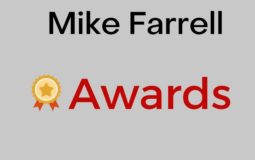- Name: Hunnicut, B.J., MD
- Rank: Captain, USAMC
- Serial Number: US94539204
- Height: 6′ 3″
- Eyes: Blue
- Shoe-size: 13.5
Age at arrival at 4077th: 28
- Education: Stanford (student fraternity Tau Phi Epsilon). Residency at Sausalito. 5 weeks army training at Fort Sam Houston
- Residence: Mill Valley, CA
- Relatives: Peg (wife), Erin (daughter), Bea Hunnicutt (mother), Jay Hunnicutt (father), younger sister, Floyd Hayden (father in law), Shirley and Selma (aunts).
Farrell on…
B.J. Hunnicutt: Good guy. The kind of person I’d like to have for a friend.
Benjamin Franklin “Hawkeye” Pierce : Hawkeye was a nut and a bit of a genius. A highly dedicated, very concerned man who had a manic streak that made him impossible to live with an impossible to live without. Alan Alda : Alan is all of that without the manic streak. He may be the most intelligent actor I’ve ever known and is certainly one of the most generous.
Margaret “Hotlips” Houlihan: Hotlips was a pistol. You never knew what was going to cause her to explode, and if she did, look out! But she was a cracker-jack nurse and a top-flight professional. And a woman with big appetites. It was great that they let her [with much prodding from Loretta] mature into something of an early feminist during the later years. Loretta Swit, on the other hand, is much more demure, much more thoughtful. A sweet, shy woman of enormous talent. The fact that she could explode into one of Margaret’s tantrums minutes after sitting quietly on the set doing her needlepoint is a testament to her ability.
Sherman T. Potter : It’s harder for me to separate Harry and Col. Potter because I adore them both so much. Col. Potter was the father figure we all loved and admired. A straight-arrow, regular army, by the book type who, just beneath the surface, was a marshmellow. Harry Morgan is a wonderful guy and a good friend. He’s full of stories, jokes, wry humor and is a delight to be around. He is and ought to be a motion picture and television legend.
Walter “Radar” O’Reilly : Radar is one of the most lovable characters ever in series television. His innocence and simple honesty were utterly winning and infectitious and the way in which his decency showed against the horror of the war was artistry. Gary Burghoff may well have been the best actor in the company, it’s always seemed to me. His focus, his ability to find those little gems of behavior that made everything absolutely true were a marvel to behold.
Frank “Ferret Face” Burns : Frank was an almost impossible character to play and Larry did it brilliantly. His tight-assed, purse-lipped authoritatian personality was so obnoxious that he was the man you loved to hate. I think the danger with the Frank character, and that probably caused Larry to eventually leave, was the fact that his behavior kept getting closer to paranoia and thus harder for us to play against. It’s not funny to make fun of a crazy person. Larry Linville was another classically trained actor who took a one-dimensional part and turned it into solid gold.
Charles Emerson Winchest II : Charles’ pomposity was hilarious thanks to David’s genius. The Winchester character’s arrival after Frank’s departure was a brilliant stroke on the part of Burt Metcalfe, our then Executive Producer. He found us a villain to play against who was, unlike Frank, our equal as a surgeon. We could poke fun at him and play tricks on him but he was just as likely to come out on top in an exchange as not. David Ogden Stiers was probably the most classically trained actor in the entire cast. His knowledge of theater and his devotion to both it and classical music are beyond my comprehension and his skill as an actor was the equal of it.
Maxwell Q. Klinger : Corporal Klinger started out as a one-joke idea and became the hero of the every man who ever wanted to finagle his way out of the military. His subversive attitude perfectly reflected what many were feeling at the time about the war and the military, but did it in an inoffensive and charming manner. Jamie Farr is a wonder. I used to say that when he walked on stage the energy level went up perceptibly. He never stopped working on trying to make the jokes better, make the character more interesting, make the situation more entertaining. And he’s doing the same thing today.
Francis John Patrick Mulcahy : A marvelous character with a sense of decency and vulnerability that were unmatched. Father Mulcahy’s innocence was different from Radar’s, but just as affecting. His was the soul of faith and decency and his presence always added something wonderful to the show (though I never felt they used him enough). William “Bill” Christopher : is a dear friend and was the perfect man to play Mucahy. He is as droll and funny as he is smart. He used to sit on the set and read “Homer” in the classic Greek. And then he would break into laughter, enjoying something he’d read, then look around embarrassed as he found us all looking at him. What a dear man!
Larry Gelbart : Another dear man. This guy can’t not be funny. He was a joke machine who had a sensitive side. He knew the show and the characters (having created many of them) inside and out and loved what it was saying. His feelings about the war and about pompositu and mindless authority were very strong and he didn’t mind writing great stuff for us to say which made those feelings clear. Larry has become a good friend in recent years and I’m richer for it.
Some addition question:
Who decided to give BJ that mustache?
It was Alan’s idea as a way to make him a bit different. I thought it was the perfect, cheesy, outrageous choice.
Which character, besides BJ would you have loved to play and why?
I can’t imagine playing any of the other characters. Everyone else did it so well.
How did you get the part in M*A*S*H? Did you have to audition for it or were you contacted by them?
I’ll answer below, but first a related anecdote. After finishing the series I did with Tony Quinn at Universal, I was held there under contract for a few more years, doing, with a few exceptions, shows that were neither very challenging nor a lot of fun. About a year and a half before MASH happened, I was sent a script for a pilot (first episode for a projected series) in which I was being asked to play the lead character (which was quite flattering). After reading the script I had a meeting with the producer and said I was flattered, but not interested. Not used to having actors turning down what could be the lucrative lead role in a prime-time series, the producer asked me why I would do that. I said: “Well, it’s not MASH.” He looked a bit puzzled and asked what I meant by that, so I said that while I thought his show was fairly funny, I was troubled by the fact that it really wasn’t about anything, and I wanted to work in a show that was entertaining, but also dealt with the world in some kind of meaningful way.
So…
Burt Metcalfe, who joined MASH as casting director to start the show, had been at Universal, where I was under contract, prior to going over to 20th [Century Fox]. He knew me and knew my work. After the second year of MASH my agent got a call saying they were having trouble negotiating the contract for the next season with Wayne Rogers and wanted to know how I would feel about coming in if they couldn’t work it out. Well, of course, I was flattered, but other than to say I’d be interested in talking to them in that event, there was really nothing to do. And, obviously, they worked out their problems and Wayne went back for the third year.
At the end of the third season, however, I read in the paper that Wayne was again rumored to be leaving and found myself wondering if I was going to hear from them this time. Sure enough, my agent got a call wanting to know if I’d come in for an interview. I went in and met with Burt, Gene Reynolds and Larry Gelbart. I had had many such meetings by this time, had done two years on a soap and starred in two prime-time series, as well as having done guest starring roles on major shows and a couple of good roles in movies for television, but I was nervous as hell in meeting these guys because I thought this was the best show on television and the possibility of being part of it was almost too exciting to bear. And I knew that they were probably seeing hundreds of actors, all of whom were talented, so the options available to them to create the character they wanted were almost beyond comprehension.
Anyway, the meeting was wonderful! I told them how nervous I was and they went out of their way to make me comfortable. We had a great conversation about the show and I told them that the one thing I wasn’t interested in doing was in playing “Trapper John”. It would be tough enough, I said, to be the new guy in the company without having to step into the shoes of a well-regarded character and pretend I was him. Beyond that, audiences had in the past shown their resentment for having new actors come in to play established characters by turning off the offending show. But they reassured me that they were going to take advantage of the fact that this was the military and people transfer in and out (or are killed, as was the case with McLean Stevenson’s Col. Blake). All they knew at this point, they said, was that the character was going to be named B.J. Hunnicutt, that he’d be from Mill Valley, California, and that he was married, had a baby and intended to be faithful to them (this as a way to differentiate him from the womanizing Hawkeye and Trapper).
So I went away happy and hopeful, but realistic. A short time later I got a call asking if I’d do a screen test. Unlike the ‘normal’ screen test, this wasn’t to see if I could act, but rather to have me do a scene with Alan Alda as Hawkeye so they could see the kind of chemistry that resulted. Two other actors were to be tested in the same way, so it was down to the three of us!
On the day of the test I overcame my nervousness enough to enjoy meeting Alan and to have a good time. A very short time after that (it may have been the same day, I’m not sure) I got a call from my agent that the job was mine.
And the rest, as they say, is history.
Was it hard to ‘follow’ in Wayne Roger’s footsteps?
It was scary. I was afraid, first, that the cast would resent me. They didn’t. Then I was afraid that the audience would reject me. Fortunately, they didn’t either.
Do/did you watch any of the re-runs?
No, not really. If I’m watching television, which is rare, and I flip past one I’ll usually stop and watch for a bit, but that’s it.
Were there any ‘real’ power struggles on the set of MASH for top billings/best lines etc., or was it as it came across on TV, all good humoured?
It was better than it came across on TV. People respected each other and we all marveled at the extraordinary situation in which we found ourselves. Of course, over the 8 years I was there I’m sure there were problems between people at times, but nothing that wasn’t able to be worked out. Certainly nothing major. It was truly a remarkable situation.



